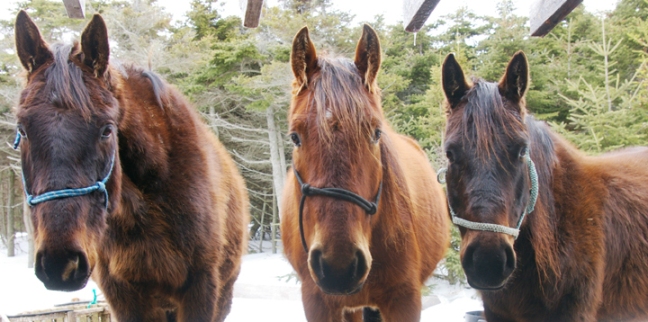To Vaccinate or Not To Vaccinate!
Will I vaccinate this year? That is the statement of the day, isn’t it? This is a question many of you are now asking yourselves.
Three Equine Diseases – Equine Western, Eastern and Venezuelan Equine Encephalomyelitis, also commonly known as: EE, EEE, WEE, VEE, Eastern Equine Encephalomyelitis, Western Equine Encephalomyelitis, Venezuelan Equine Encephalomyelitis
These viruses are transmitted by the bite of the mosquito and can be passed through to humans. Each strain is unique to an area so that EEE is seen in Eastern North America, WEE in Western areas and Venezuelan is widespread in South America.
Symptoms – include increased temperature, listlessness and loss of appetite. Initially the disease may be so mild that it isn’t noticed. As the disease progresses, the horse may show signs of irritation and nervousness, extreme listlessness, and eventually paralysis and death. Humans, donkeys, mules and horses are susceptible.
Treatment – Veterinary care in the early stages is crucial. Although there is no specific treatment available, treatment of the symptoms with drug and vitamin therapies may help a horse survive the effects of the virus.
Prevention – Vaccination is the best preventative for EEE, WEE, and VEE. Individuals with the disease should be quarantined and steps to reducing biting insects taken. If you live in an area where EE is prevalent call your veterinarian for the recommended vaccination schedule.
Here on the Islands

Gimme A Dream, Woodmere Frilifili, Willow Breeze
Spring time has arrived on the islands. Crocuses are peeping up through the melted snow banks and muck is everywhere. Soon the grounds will be lit up with tulips and daffodils and soon after the insects arrive in fury. Actually I saw the first mosquito yesterday flying around. It must be the male mosquitoes that comes out of hibernation first because they don’t bite this time of the year. Instead, the females become the vampires of the insect world late in June or even in early July here. They are monsters for the horses, from around 9:00pm to midnight and early mornings also, sometimes.
So do I vaccinate? Not this year! There has been no accounts of the eastern strain virus on the islands to date. Granted it is only a matter of time, because the strain has been noticed in Eastern Canada, but because of the isolation of my three horses, I’m estimating that the risk is minimal and I just don’t have the money for needless frivolities, this year.
However, as in all years, I’ll make a special trip to the veterinarians office to get the local gossip on local contagious diseases. I try to keep myself informed. I’ll be listening to the gossip, to hear who lost what horse and why, then I’ll ask the vet what her thoughts are on the subject and determine if there is any contagions in the area. That is the least I can do without putting more pressure on the pocketbook. But I won’t be worried about infected mosquitoes this year.
My Attempt at Natural Bug Control
I’m attempting to make a natural bug control system this year. I bought eight laying hens which are now free range in the wetland area of the horses pasture and paddocks. I’m hoping that they will control some of the insects that bother the horses and humans alike.
The hens are becoming very precious to me. There is one hen who enjoys her own company so much that she doesn’t return to the hen pen at night. At five in the morning, I took grain out to the hens and there she was waiting to be fed. They others were all still locked up for the night. I picked her up and hugged her tight and stroked her soft feathers. She didn’t mind! Then I returned her to the pen and dropped the grains in their dish.
I leave a light on all night. It is not good for the hens since it keeps them awake, but I feel as though I have little choice. The pen is in the greenhouse and there are fox in the area. My neighbours say the fox is starving but that is not true. They all throw leftovers out for the fox and crows and I’ve seen the fox with the horses. He is not starving. However, the light serves to keep him away from the greenhouse.

 Gimme A Dream is a Horse, an Hanoverian gelding to be exact. He is not the most perfect horse in the world. In fact, Gimme is far from perfect, but he is mine (or I’m his). He stands almost 17hh and weighs almost 1400 lbs. He is a big boy and when he wants something, not much stands in his way. But I do…, and that leads to conflict!
Gimme A Dream is a Horse, an Hanoverian gelding to be exact. He is not the most perfect horse in the world. In fact, Gimme is far from perfect, but he is mine (or I’m his). He stands almost 17hh and weighs almost 1400 lbs. He is a big boy and when he wants something, not much stands in his way. But I do…, and that leads to conflict!







